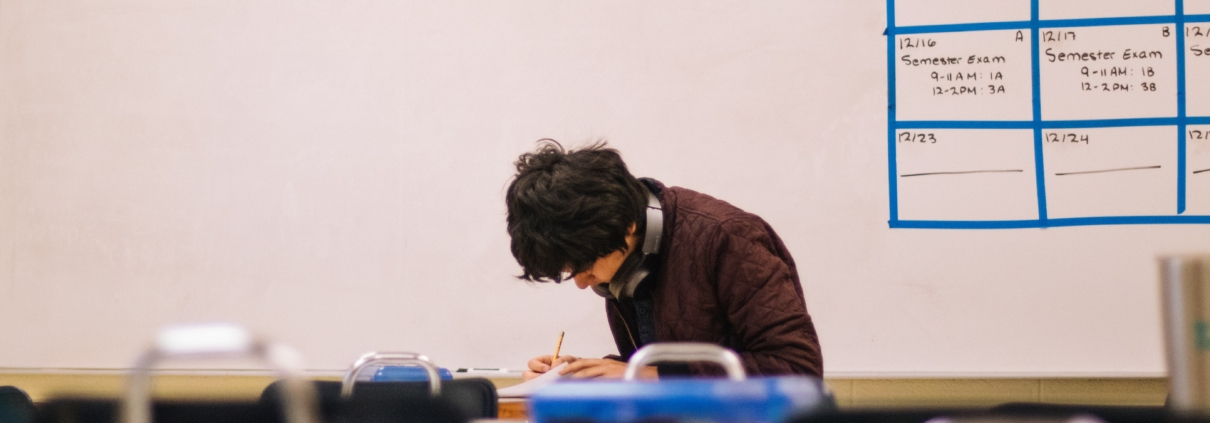
Which exam formats are possible this semester?
As we have received a lot of concerns about possible exam formats for this exam periode, we have collected all the exam formats that we have heared about so far.
Of course, the faculty and the chairs will decide in which way they will do their exams!
Classic Attendance Exams
Classic Attendance Exams, when following a strict hygiene concept, will be theoretically possible this semester. This means that for example about 70 people can write an exam in the Audimax at once, which brings up a huge capacity problem when planning a classic attendance exams, since the whole TUM can only provide approximately 560 seats at once. Even more important is your health. Even with all hygiene rules, the risk of infection will remain during the exam and also during the trip to and from the university.
Furthermore, since approximately one third of the students at TUM School of Management are international students, who are currently in their home country and who could face problems to enter Germany to write exams. Therefore attendance exams would create a big disadvantage for international students.
Supervised Computer-Based Written Exams
This form of examination will involve exams, that the examinee will fill out on the computer, while a webcam films the examinee and plugin checks for attempts to cheat, for example with the third-party program Proctorio. This tool uses artificial intelligence to analyse the line of vision or the desk of the examinee, so open book exams are not possible with this format. The program will report suspicious situations to the examiner, who then needs to confirm the attempt to cheat by watching the recording. The largest advantage is, that even large exams with up to 500 attendees are possible to every student. However, you would need the required hardware, such as computer, webcam and microphone, as well as a very stable and rather fast internet connection. Also only multiple choice or free text tasks are possible in this scenario, which makes it hard to conduct any kind of for example mathematical questions. In addition, Proctorio will store and process your data on German servers until the exam is graded. Also keep in mind, that only one exam via Proctorio can be held at once. You will be asked to take a mandatory test-exam before every exam, which should enable you to get used to the tool and may resolve any concerns about this new and unfamiliar tool.
The TUM is also working on an information page about data privacy questions regarding the use of Proctorio right now, so more information on that coming soon.
Chrome as browser is a requirement to attend exams via Proctorio.
Supervised Remote Written Exams with Pen and Paper
In this case, the tasks will be uploaded to Moodle at a fixed time. The examinee can then answer the exam questions with pen and paper, while being monitored by a video conference with a supervisor. Possibilities to cheat are comparable to normal exams in lecture rooms. After the exam, the examinee will then send a photo of the test and send it to the examiner as well as sending the original via mail. Since one supervisor can only watch over 10 to 15 students, the number of students, who can take the exam, depend highly on the number of available supervisors.
Oral Remote Exams
Oral Remote Exams could take place instead of planned attendance oral exams or as a special replacement. The exam would be conducted via a video call with an examiner, the examinee and an assessor. Tools that could be used could be Zoom or BigBlueButton, so you would need a camera, a microphone as well as a stable internet connection for this exam. In this format, the data protection issues are manageable, since the exam is not recorded. Cheating can be prevented by a 360°-scan of your room before the exam. Advantages are that this is a format, that students are already familiar with and flexible reactions are possible, when technical problems occur during the exam. The problem that occurs with this format, is that the workload increases linearly to the number of examinees. Also since the exam questions are limited, the comparability between the first and last examinee is not possible anymore. Also this type of exam is only suitable for certain types of exams. We should also think about the increased nevosity of students in oral exams.
Remote Student Presentation
In this form of exam, student would give presentations as a livestream or uploaded video. For a livestream one would need a good internet connection, as well as a camera and microphone. In this case data protection problems are limited and the ways to cheat are similar to regular presentation. This exam would be a alternative for seminars and small lectures.
Graded Work handed in during the semester
This format is already partly implemented for grade bonuses or part of an exam and could be expanded for this semester. Since this semester is already rather far along, this format could lead to a huge workload at the end of the semester. Also the correction of the work would generate a huge workload for tutors and the lecturer, which only makes it feasible for small lectures and seminars. But since this method doesn’t require special hardware or great internet connection, and can be worked on independently, this format would benefit the students greatly.
Want some more information? Check out the article of the MPI Student Council here.
If you have any quesions, you can always reach out to us via mail.
Your Student Council TUM SOM

